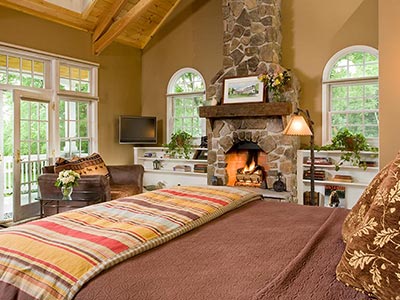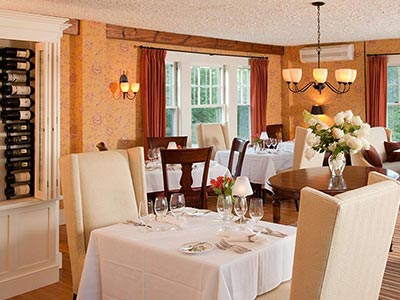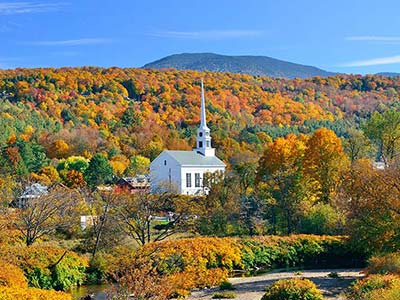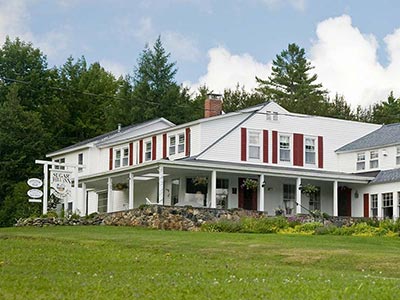Chapter 20 The Art of Innkeeping
If we can grow it in our garden or make it in our kitchen that’s ideal. Buying cheese, maple syrup, eggs, produce and art from Sugar Hill makes us happy. When not available in Sugar Hill we seek out made in New Hampshire followed by New England.
Some people just need a place to sleep while visiting the White Mountains. That is not the business we are in. We are here for guests that believe where they stay is an essential part of the overall experience. Providing an authentic Sugar Hill/New Hampshire/New England experience is important to us. You will not get that at the Hampton Inn. You will also not get it at properties that heavily discount on Priceline, Travel Zoo or Groupon. The details we worry about are the first to be cut by discounters.
For ten years I have been making Sunday Morning crepes filled the eggs and ham for breakfast. The original recipe came from a well-known French Bistro in New York City. Although they always tasted delicious, at first nobody was ordering them. So I replaced the Gruyére cheese with Harman’s Cheddar from Sugar Hill, super market eggs with local cage free eggs and a national brand flour with flour from the Littleton Grist Mill. Today our Famous Sunday morning Crepes are extremely popular.
We think of local in broader terms then just food. Unlike many in the industry we do not bring foreign workers in on Visas. We think that it is important that your breakfast server is a local. When my decorator recommended Hubbardton Forge light fixtures, hand made in Vermont, for all of the inn’s common areas, as apposed to made in China, I knew that she understood. My wife Karen sewed many of the window treatments, bedspreads, decorative pillows and bed skirts. Karen is in love with fabrics, colors and texture. Take a look in on Bickford or Garden; that is her workmanship.
Going local is nothing new. That is the way it has been for most of history. Anyone who has been to Europe knows how great those local farmer’s markets are. They are in every town. In the 50s and 60s with the growth of corporate agriculture, huge consumer products companies like Kraft and more women returning to the work force, food became a commodity, beautifully packaged, frequently frozen, sold in large supermarkets and designed for a fast supper. Most family friendly chain restaurants are just selling fancy TV dinners.
In 1971, the year I graduated from high school Alice Waters opened Chez Panisse, a Berkeley, California restaurant that became famous for its organic, locally-grown ingredients and for pioneering California cuisine. How ironic that in 2006, my first year in New Hampshire I would be reading her biography while dining alone at an Applebee’s. I highly recommend the book. Alice would make it a point to visit local farmers to see what they were growing. At the time she had no idea that she would be starting a movement.
Another book that I highly recommend is Animal, Vegetable Miracle by Barbara Kingsolver. In that book a family agrees to eat only locally for a year. While a great read the idea is too radical for me. For me it is important to put the wants and needs of my guests first. Of course they want real maple syrup from New Hampshire but they also want orange juice from Florida, strawberries when they are out of season, whisky from Scotland and wines from France, Italy and New Zealand. So our approach has been to add local elements wherever possible but not to deny anyone their favorite luxuries from around the world.
Occasionally we need to back off on a local product. We found this extra thick and extra meaty smoked bacon from the North Country Smoke House. Great favor. For some reason our guest have a thing for crispy bacon and lean thick cut bacon does not get crisp. From time to time we do buy some of their other products that are all superb. We had also for several years experimented with locally made soaps.
I am not trying to prove a point or be elitist. I am just trying to do what feels right. I remember being in my local bakery before moving to New Hampshire and seeing a truck pull up and in came several trays of their special gourmet cookies. What kind of bakery doesn’t bake their own cookies? I was so disappointed. Call me naïve, but I was totally surprised when at Shaw’s deli department I saw those pretty salads being refilled from a box. Obviously there are no elves in the back room.
Whenever I dine out and the desert menu appears, I always ask if the deserts are made in house. Ninety percent of the time the answer is no. If they come from a fabulous kitchen down the street that’s fine however most of the time they are purchase from large food distributor, made in far away factories using ingredients that you would never use in your home kitchen. That explains why almost every restaurant seems to have a Mississippi Mud pie. At the Sugar Hill Inn all desserts are made in house including ice cream.
Being local is as simple as celebrating the seasons. Being excited about the first local strawberry or the first ripe tomato picked from the inn’s vegetable garden. I have childhood memories of eating the best corn on the cob grown by my grandfather and cooked immediately after being picked. The natural sugar in corn as soon as it is picked starts to convert to starch. That is why I would never buy supermarket corn.
Shortly after buying the Inn, Nancy and Lon, the former owners of Sunset Hill invited me to have dinner in their private residence. At this dinner I had fiddleheads for the first time. Fiddleheads are actually young fern fronds that have not yet opened up. Fiddleheads grow wild in the North Country and are only available for a few weeks in June. We also have wild chanterelle mushrooms growing in the White Mountains. The combination of being unique to the area and seasonal is local at its best. Every summer, Lars our mushroom hunter and expert will show up with a box of chanterelles with a hand written bill on a scrap of cardboard. At the end of the season he will disappear until next year. I have no idea what he does the rest of the year.
Going local means different things to different people. Some are environmentalist worrying about all the unnecessary green house gasses caused by shipping food to distance markets. While that is not my motivation I see little logic is importing Evian water from France.
I have already said that my number one reason for pursuing local is to create an authentic New Hampshire experience. Number two is quality. Nothing can beat a tomato just picked from the garden or an apple from a near by orchard. Between June and September we buy the most amazing strawberries from Four Corners farm in Vermont. They are generally twice the price of super market berries but they are worth it. In the fall we keep a bowl of Windy Ridge apples out for the taking. These are the kinds of foods that create memories. We serve local eggs and guests can clearly tell the difference. Why is there such a big difference? Super market eggs can be weeks old compared to just a few days. Cage free and premium feeds also make a difference. However if you are a hard boiled fan it is my understanding that old eggs work best.
Going local supports our local economy and that is a good thing. In the process I have met some impressive business people and they are a pleasure to work with. These are fellow entrepreneurs that I can relate to. Dan of White Mountain Canning comes to mind. His Jams, jellies and honeys have freshness you can’t find elsewhere.
I know that coffee beans with the exception of Hawaii, don’t even come from any where in the USA but a brand that at least identified with the region was a step in the right direction. When I purchased the inn the previous owners were buying from New England Coffee, a Massachusetts company. Every other week Ruth would call us to see what we needed however if we had not paid the prior invoice fast enough a doe doe in accounts receivables would cancel the order without notice. My experience with accounts relievable people is that they do more harm the good for their employer. We dropped New England Coffee for Green Mountain Coffee, a Vermont company. We liked that they sold Fair Trade Organic Coffee. In 2006 Green Mountain purchased Keurig. With the tremendous success of the K cup, Green Mountain became a hot stock on Wall Street and the company lost interest in serving local businesses and out sourced the job to a distributor. They also stopped making the hospitality packs that we used in our rooms. Convert your rooms to K-cup or else. We were now forced to buy from a distributor who had no affinity for coffee and we were just an account number. As I frequently do, I wrote the President of Green Mountain to complain about their lack to customer service. I am still waiting for an answer.
After doing tastings from several local roasters we selected White Mountain Gourmet Coffee. It takes knowledge and talent to be in the coffee business. There is a lot more to it then just being local and a nice guy. Every Tuesday Richard, the owner calls us for our order. The coffee is roasted on Wednesday and delivered on Thursday. Going local with our coffee not only gave us better quality but also gave us better service and supports the local economy. Unlike New England and Green Mountain Coffee, White Mountain Coffee treats us like a valued customer and they are just fine with us paying with one check for all deliveries at the end of the month. A lot of big companies do not understand that trust is a two way street and a handshake is more powerful then a contract and arbitrary policies.
Visitors come to New Hampshire for our beautiful mountains, rural landscape and quant villages on towns. By supporting our local farmers we are helping to maintain the state’s rural character. Guests of the Sugar Hill Inn are also doing their part by preserving a historic 1789 farmhouse, 14 acres of natural woodlands and a business that can trace its roots back almost 90 years.
Getting started with going local is harder then it sounds. Unlike states like California, New Hampshire has a relative short growing season. New Hampshire unlike it neighbor Vermont with its counter-culture was late to the artisan food movement. In the nearby town of Bethlehem every season there seems to be a new Farm to Table Restaurant. Unfortunately they close at the end of the season never to return.
The problem is that everything is more expensive and you need to be in it for the long haul. It takes time to educate your guests as to the value of local, to demonstrate its superior quality and the time it takes to be discovered. It is a serious commitment.
In the early years I planted blueberry bushes, served local syrup, used flour from the Littleton Grist mill but all that really did not add up to that much. It took five years for the blueberry bushes to mature and to produce a significant amount of fruit. Three factors played a significant role in moving us from nice try to being Certified Local by the State of New Hampshire.
Chef Val, his wife Nancy, Karen and myself attended a meeting sponsored by the New Hampshire Restaurant Association. We heard presentations by other restaurants about their success with “Farm to Table”, we meet vendors from New Hampshire and we receive a handout of the requirements to be certified local. This hand out became our road map. In the car I asked if everyone was on board. Everyone agreed.
This road map assigned points to every category of food. Some things we were already doing such as featuring local beer. Other items took some research. We needed to replace the Poland Springs bottled water we were placing in our rooms with New Hampshire water. Not only were we successful we found out that we could have it delivered by our beer distributor at a lower cost then we were previous paying at the super market.
For milk and dairy it was as easy as identifying the local brands. Why buy Philadelphia cream cheese or Breakstone sour cream when you could buy Cabot. We learned that Cabot was a cooperative of New England farmers including New Hampshire. Stony Field Farm’s organic yogurt that we serve at breakfast is also made in New Hampshire.
Finding made in New Hampshire be came a fun adventure. We needed five New Hampshire wines. Most of the in state wineries were using grapes purchased out of state or making wine from other fruits. Neither scenario was of interest. We discovered that Candia Winery grew their own grapes but we wanted to see for ourselves. Karen and I followed the GPS to a suburban development 20 minutes east of Manchester. We found a ranch house with vines in the front yard. A sign from the driveway pointed to the backdoor for the tasting room. We went down 5 steps to the basement. There really was not a tasting room but at the bottom of the stairs we met the owner and tasted several wines. Behind him were some small tanks obviously used in the wine production? This was a one-man show. He grew the grapes, made the wine and did the marketing. Most of the varietals were unfamiliar to me. They had been cultivated to withstand New Hampshire’s cold climate. The wines were all sweet. You can hide a lot of imperfections when sweet. They also had a line of what they called ice wines. In premium ice wines from Canada the grapes are hand picked from frozen grapes still on the vine producing not only a sweet wine but wonderfully intense flavor. The New Hampshire ice wines are made by freezing the grapes after harvest. I call that cheating. Figuring that these were the best we could find in New Hampshire we purchased few cases and head back to the inn.
In addition to wine we have General Stark Vodka. General Stark was New Hampshire’s revolutionary war hero who coined the saying “Live free or Die”. At the request of one of our frequent guests from Maine we have Cold River Vodka. We also have Whistle Pig, a straight Rye from Vermont.
As part of the certification process Charlie Burke the volunteer leader of the Farm to Restaurant program met Val, Karen and I at the inn and reviewed our paper work. More importantly he was a wealth of knowledge as to local farms and vendors. Just recently he recommended a New Hampshire farm for lamb. This lamb, currently on the menu, from Meadow View Farm in Gilmanton, New Hampshire is absolutely the best.
Our research uncovered a wealth of local cheeses. As a result we added a local cheese course to the menu that could be enjoyed instead of desert or as an additional course. This might sound funny to people from big cities but frequently at these local creameries and farm stands you help yourself and leave your money in an unattended box.
Another important factor in helping us go local was the opening of the Littleton Food Coop. We own four shares. They have made it a point to feature as many local items as possible. This has been most helpful because many farmers don’t have the ability or interest in small retail sales.
I am the breakfast chef so making progress in the morning was relative easy. However I also needed Chef Val to be totally committed. Going to the DiRona conference in Napa did the trick. Besides from sampling mass quantities of great wine, world famous chefs were giving presentations about growing their own produce and herbs and the relationship they had created with local farmers. All of this was very inspiring and Val came back with ideas and plans take the restaurant to the next level.
Going local is a never-ending search for what is next. The green beans that were abundant and perfect last week are no longer available but for the next two months we will be able to source seafood from a New Hampshire based fleet of fishing boats. I know that many of our guest are quite aware and appreciate of our affords. For everyone else I hope that on a subconscious level our quest for getting the details right is contributing to the over all feelings of enjoyment and well-being.
Want to know more? Read our book “Sugar Hill Inn Art of Innkeeping.” Available from Amazon and Barnes and Noble.












